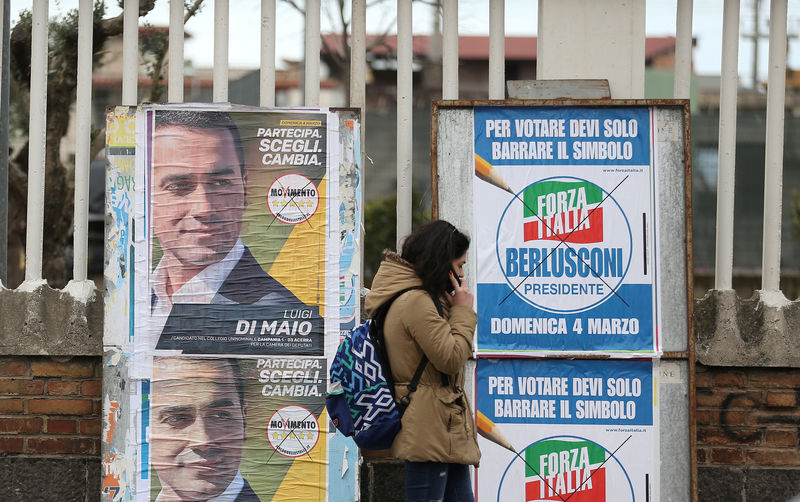By Dhara Ranasinghe and Ritvik Carvalho
LONDON (Reuters) - Investors are feeling sanguine ahead of Italy's March 4 election. The economy is strengthening and anti-euro sentiment is waning in the single-currency bloc.
But the vote has the potential to throw them a curve ball.
The election is on the same day as Germany finds out the results of a ballot of Social Democrat party members on a coalition deal with Chancellor Angela Merkel's conservatives.
The outcome could seal or end Merkel's hopes for a fourth term in office.
The German result is also important for southern European countries including Italy since a new coalition is expected to take a more pro-European stance and a conciliatory approach to fiscal policies in the bloc.
Here are five key questions for investors.
1. What's the most likely outcome of Italy's election and what would it mean for investors?
The latest polls point to a hung parliament, where no one party or coalition has a majority to form a government.
If this happens, Italian President Sergio Mattarella, will call on parties to form a broader coalition of pre-election adversaries. This could include the ruling center-left Democratic Party and Silvio Berlusconi's Forza Italia.
For a full interactive graphic on the election polls: http://tmsnrt.rs/2oluYph
Analysts see a hung parliament, leading to a broad coalition that includes mainstream parties, as the most positive market outcome because it could result in political stability and policy continuity on Europe.
Even in this situation, any uncertainty over the government's make-up could lead to short-term volatility.
Analysts at BNY Mellon say political uncertainty in general has become a key force for major currency markets in the past year and "serious attention" needs to be paid to Italy's election.
2/ What could take markets by surprise?
This election takes place under a new, untested voting system introduced last year, which makes the outcome particularly uncertain.
It is possible that a coalition of center-right parties, leading in the polls, will win a majority of its own.
One surprise would be a center-right victory, with the eurosceptic League as the biggest party, possibly enabling its leader to become prime minister. Success for the League, which calls the euro a "failed currency," could revive euro break-up fears and widen the gap between Italian and German bond yields.
An election outcome that allows the League or the anti-establishment 5-Star Movement to have a central role in government may have the same effect. And if a government is not formed, fresh elections cannot be ruled out.
3/ What about Germany's SPD ballot results?
The result of the vote, key to ending five months of uncertainty in Europe's biggest economy, is wide open.
A 'yes' vote from 464,000 Social Democrat (SPD) members on whether the center-left party should join Merkel's conservatives in government would allow a new coalition to press ahead with crucial European Union reforms.
A 'no' vote would either trigger new elections or bring in a minority government, which would then have to seek ad hoc alliances to pass legislation.
That would prolong political uncertainty and hurt business sentiment. It would also be a shock for southern European debt markets. These rallied after the coalition agreement as the deal was seen heralding a shift toward looser purse strings in Berlin and a pro-European stance..
"If we assume that the coalition goes through as planned, there might be changes in policy and more co-operation in Europe which for us as investors is positive," said J Patrick Bradley, senior vice president, investment research at Brandywine Global.
4/ Will the winner of Italy's election tackle the debt pile?
Probably not. Whatever Italy's next government looks like, the chances that it will push through long-term term structural reforms to improve Italy's economic performance or to tackle the country's debt pile, are low. At 132 percent of GDP, Italy has the European Union's worst debt ratio after Greece.
In fact election pledges could worsen the situation - Bank of Italy Governor Ignazio Visco has cautioned that parties' pledges to slash taxes and hike spending could prove counterproductive since the problem of high debt "cannot be sidestepped."
That could increasingly bring investors to view Italy as the euro zone's weak link, making Italian assets vulnerable at times of market uncertainty or during the withdrawal of European Central Bank stimulus.
5/ What does this mean for ECB monetary policy?
At the margins, a thumbs-up for Germany's coalition deal will suggest modest fiscal expansion, adding in turn to better growth and higher inflation. That could hasten the end of the cheap-money era and keep upward pressure on borrowing costs.
If Italy's election too passes without major ructions, it will remove a layer of political risk from the calendar and reinforce the case for unwinding ECB stimulus.
Focus can then turn to the next ECB chief, a post that changes hands next year. While speculation is of a German - possibly the hawkish Bundesbank chief Jens Weidmann - taking the reins after the departure of "southerner" Mario Draghi - Germany's Social Democrats say they have not discussed backing Weidmann for the role.
But any negative surprise outcome from Italy or Germany could encourage the ECB to keep asset purchases in place beyond their September end-date, in turn prompting investors to rethink the timing of rate rises.
GRAPHIC: http://reut.rs/2CH5Xte
GRAPHIC: http://reut.rs/2CExJGs
GRAPHIC: http://reut.rs/2CFATK3
GRAPHIC: http://reut.rs/2CEwE1m
GRAPHIC: http://reut.rs/2ENolqa

GRAPHIC: http://reut.rs/2ELrF54